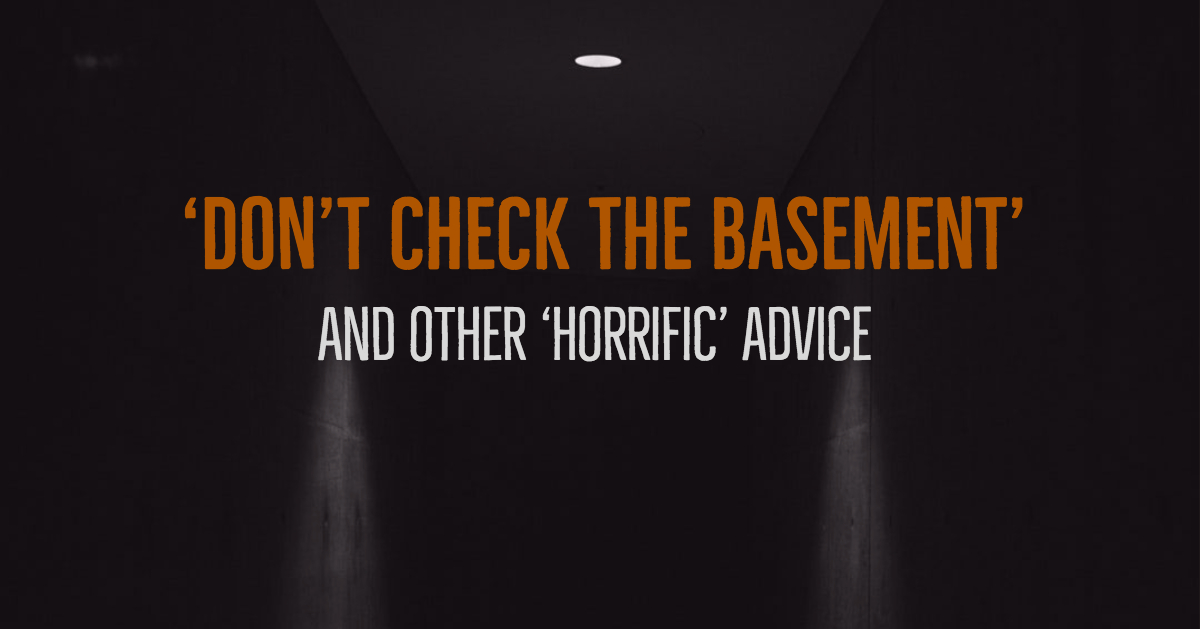‘Don’t check the basement’ and other ‘horrific’ advice
If you’re reading this blog post on the day it goes live, Happy Halloween! I have to admit, I’m partial to this fall holiday for all of the spookiness it brings. My teenage years were filled with scary movies, haunted houses and ghost stories, a unique connection shared with my mom and sister. Now separated by three states (Florida, Tennessee and Wisconsin), we often chat on the phone about the horror movies and scary shows streaming on Netflix and Hulu. We can’t watch them together anymore, but we can enjoy the shared experience digitally!
I’ve seen my fair share of scary flicks, from the downright terrifying to the hokily hilarious, each leaving me with tangible advice I can apply to my regular life. Sure, the most obvious is “don’t check the basement,” but I don’t have a basement, and I’m not particularly scared of bumps in the night. Rather, I choose to take the more abstract with me, and I’ve found that there are a number of lessons communicators can glean from the horror genre.
Before you read further, there are spoilers for horror movies from the 70’s, 80’s and 90’s. The movies referenced are at least 19 years old. I’m not saying it’s on you if you haven’t seen them but… proceed with caution!
- There’s a time to scream and a time to whisper.
Almost every good horror movie has a scene where the predator is seeking out the prey. The prey, typically your hero or heroine, is hiding, covering his or her mouth trying not to make a sound (think Jamie Lee Curtis in the original Halloween). There are other times when the chase is on, and the only hope is to shout for help from the rooftops. The challenge is knowing when to choose silence, and when to speak out. As PR practitioners, we need to carefully evaluate situations and time our statements perfectly to avoid trouble.
- Age and experience beget confidence.
In Jaws, there is a pivotal scene in Amity’s city hall where the town’s leaders are panicking about what to do with the recent shark-related deaths. The chaotic conversation comes to a (literal) screeching halt when a gruff sailor drags his nails across a chalkboard in the back of the room. Enter Quint, a gruff shark fisherman whose experience makes him the only man capable (and brave enough) to take down this “bad fish.”
PR practitioners can relate. Fresh out of college, you’re still working on stabilizing your sea legs. Much like newly hired police chief Martin Brody, you need an experienced mentor, like Quint, to rely on when the job gets especially challenging. But, Quint’s demise is a cautionary tale…
- Arrogance will be your downfall.
Confidence is one thing, but in a field where you must constantly be on your toes, arrogance is your worst enemy. Arrogant PR practitioners are blind to the facts around them, believing that they know best and acting as such. Time and again in horror films you see the over-confident character meet an early demise, much like Captain Quint. Sadly, Quint is eaten by the very shark he’s trying to conquer. Luckily, he’s had enough time to impart his knowledge on the young Chief Brody.
- Sometimes, you need to talk to the monster to expose its weakness.
There are few horror movies as transcendent as Stephen King’s classic IT. The story centers around childhood fears (literally), and the protagonists are forced to confront the creepy clown to determine their plan of action. The storyline only gets more complex from there, but essentially, the children are able to determine that the clown is fed by fear itself. Once they understand this, they’re able to realign their energies to overcome Pennywise.
PR practitioners and communicators have to confront difficult situations head-on and ask the hard questions. Whether you’re dealing with a crisis or a particularly difficult client, without asking challenging questions, you’ll never be able to expose the truth and effectively communicate.
- If you confront your fears head-on, you may find they’re not so scary after all.
I’ll leave you with a bit of advice from a favorite of mine, The Sixth Sense. The plot centers around a little boy, Cole, who is struggling with a unique ability – he sees dead people. Not surprisingly, this “gift” has proven to be an enormous burden to him, so much so that he gets guidance from a child therapist. Through his therapy, he learns that the spirits who visit him aren’t evil, they just need help finding rest.
I can’t claim that public relations is a practice that transcends this plane of reality, but I can say that there is a great lesson to be learned from Cole’s journey. The things that often scare us professionally are great opportunities for us to step up and grow. Be it public speaking, leading meetings or pitching a national reporter, you may find that facing your fears will prove to be empowering, rather than petrifying.



